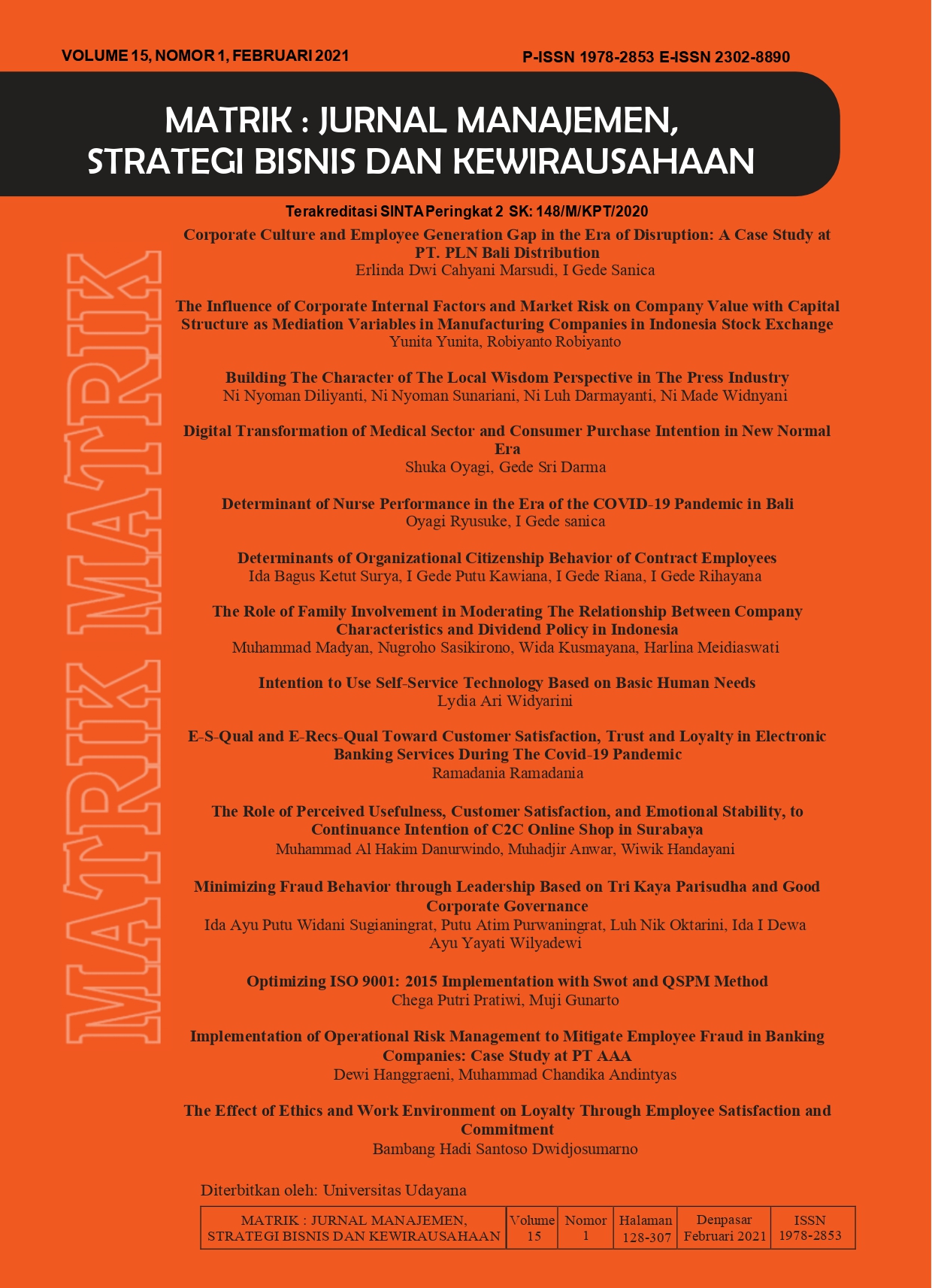E-S-Qual and E-Recs-Qual Toward Customer Satisfaction, Trust and Loyalty in Electronic Banking Services During The Covid-19 Pandemic
Abstract
During the pandemic, many countries adopted physical & social distancing policies, lockdowns, or territorial quarantine. Therefore the use of electronic banking services has increased sharply, including in developing countries such as Indonesia. Electronic banking services that are popularly used by many customers are in the form of internet banking and mobile banking. This study aimed to analyze; 1) the impact of the core online service quality (E-S-QUAL) on customer satisfaction, 2) the effect e-recovery service quality (E-RecS-QUAL) on satisfaction, 3) the effect of satisfaction on customer trust and 4) the effect of trust on customer loyalty. This research is causality research or explanatory research. The data collected by survey method to 120 respondents from customers who are registered users of e-banking (i.e. internet banking or mobile banking) from Mandiri, BCA, and Bukopin Bank. The results showed that the core online service quality (E-S-QUAL) and e-recovery service quality (E-RecS-QUAL) proved to have a positive influence on customer satisfaction. This research also proves the strong positive relationship between satisfaction and trust, as well as trust also has been shown to have a strong influence on customer loyalty.
Downloads
References
Ariff, M. S. M., Yun, L. O., Zakuan, N., & Ismail, K. (2013). The Impacts of Service Quality and Customer Satisfaction on Customer Loyalty in Internet Banking. Procedia - Social and Behavioral Sciences, 81, 469–473. https://doi.org/10.1016/j.sbspro.2013.06.462
Calantone, R. J.. David A. Griffith dan Goksel Yalcinkaya. (2006). An Empirical Examination of a Technology Adoption for the Context of China. Journal of International Marketing, Vol 14: 1-27.
Dhurup, M., Surujlal, J., & Redda, E. (2014). Customer perceptions of online banking service quality and its relationship with customer satisfaction and loyalty. Mediterranean Journal of Social Sciences, 5(8), 72–80. https://doi.org/10.5901/mjss.2014.v5n8p72
Dwi Setiady, 2020. Penggunaan Mobile Banking dan e-Money Meningkat Pesat
https://www.suaramerdeka.com/news/ekonomi-dan-bisnis/232455-penggunaan-mobile-banking-dan-e-money-meningkat-pesat. suaramerdeka.com, Bandung. Rabu, 24 Juni 2020, jam 19:47 WIB
Ferdinand Agusty Tae. (2013). Metode Penelitian Manajemen: Pedoman Penelitian untuk skripsi, Tesis dan Disertai Ilmu Manajemen. Semarang: Universitas Diponegoro.
Kotler, Philip. (2002). Manajemen Pemasaran edisi Millennium dua. PT.Prenhallindo, Jakarta.
Kotler, Philip. (2002). Manajemen Pemasaran, Analisa perencanaan, Implementasi dan control, Edisi Kesembilan, Jilid 1 dan jilid 2, Jakarta, Prehalindo, alih bahasa oleh Hendra Teguh S.E.,A.K., dan Ronny A. Rusli, S.E.
Lupiyoadi, Rambat dan A. Hamdani. Manajemen Pemasaran Jasa, edisi kedua. Jakarta: Salemba Empat, 2006.
Morgan, R. M., & Hunt, S. D. (1994). The Commitment-Trust Theory of Relationship Marketing. Journal of Marketing, 58(3), 20. https://doi.org/10.2307/1252308
Parasuraman, A., Zeithaml, V. A., & Malhotra, A. (2005). E-S-QUAL a multiple-item scale for assessing electronic service quality. Journal of Service Research, 7(3), 213–233. https://doi.org/10.1177/1094670504271156
Salehnia, M., Saki, M., Eshaghi, A., & Salehnia, N. (2014). A model of E-Loyalty and word-of-mouth based on e-trust in E-banking services (case study: Mellat Bank). 8th International Conference on E-Commerce in Developing Countries: With Focus on e-Trust, ECDC 2014, April. https://doi.org/10.1109/ECDC.2014.6836764
Solimun, Fernandes Adji Achmad Rinaldo, Nurjannah. (2017). Metode Statistika Multivariate: Pemodelan Persamaan Struktural (SEM), Pendekatan WarpPLS. UB Press.
Tambusai, S. R. K., Suharyono, & Pangestuti, E. (2019). Pengaruh Eservice Quality Dan Erecovery Service Quality Terhadap Perceived Value , Ecustomer Satisfaction Dan Ecustomer Loyalty ( Studi Pada Pelanggan Online Shopping Di Website. Profit, 13(2), 73–80.
Tharanikaran, V., Sritharan, S., & Thusyanthy, V. (2017). Service Quality and Customer Satisfaction in Electronic Banking. International Journal of Business and Management, 12(4), 67. https://doi.org/10.5539/ijbm.v12n4p67
Tjiptono, Fandy dan Gregodius Chandra. 2005. Service, Quality & Satisfaction.Yogyakarta
Wiratmini Ni Putu Eka, 2020. Judul Digital Banking Melesat, Tren Penutupan Kantor Cabang Bakal Berlanjut. https://finansial.bisnis.com/read/20200726/90/1271244/digital-banking-melesat-tren-penutupan-kantor-cabang-bakal-berlanjut. Bisnis.com tanggal 26 Juli 2020, jam 13:38 WIB.
Zeithaml, V. A., Parasuraman, A., & Malhotra, A. (2002). Service Quality Delivery through Web Sites: A Critical Review of Extant Knowledge. Journal of the Academy of Marketing Science, 30(4), 362–375. https://doi.org/10.1177/009207002236911
———, A. Parasuraman, and Arvind Malhotra (2000), “A Conceptual
Framework for Understanding e-Service Quality: Implications for
Future Research and Managerial Practice,” working paper, report No.00-115, Marketing Science Institute, Cambridge, MA.
 This work is licensed under a Creative Commons Attribution-ShareAlike 4.0 International License.
This work is licensed under a Creative Commons Attribution-ShareAlike 4.0 International License.

















